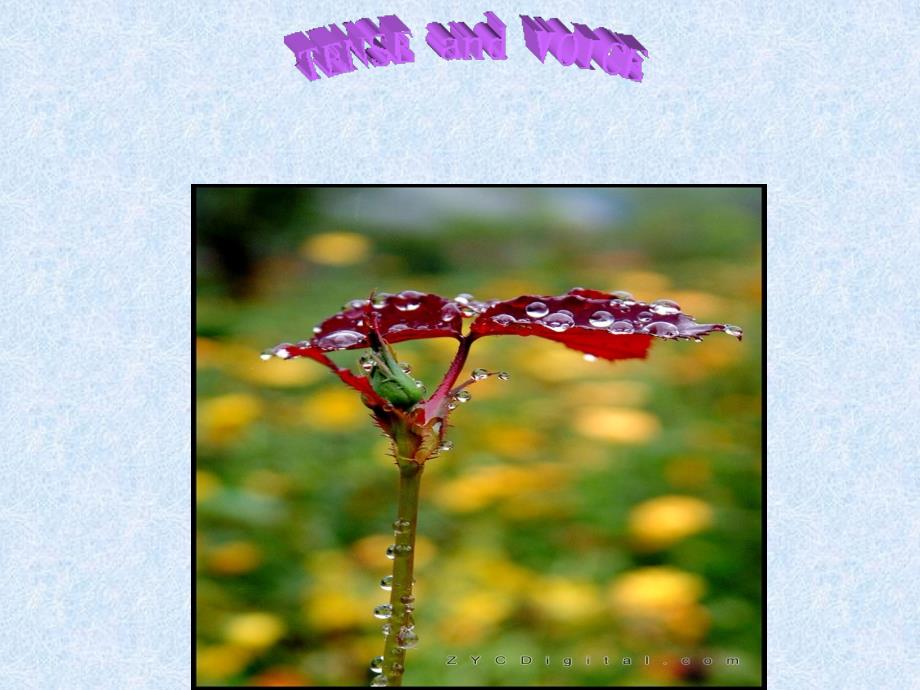 语法时态与语态1课件
语法时态与语态1课件



《语法时态与语态1课件》由会员分享,可在线阅读,更多相关《语法时态与语态1课件(156页珍藏版)》请在装配图网上搜索。
1、动词的时态动词的时态一一.一般现在时的用法一般现在时的用法1.经常性或习惯性的动作,常与表经常性或习惯性的动作,常与表示频度的时间状语连用。示频度的时间状语连用。如:如:usually,often,always,seldom,every,sometimes,at,onSundaye.g:Ileavehomeforschoolat7everymorning.2.客观真理,客观存在,科学事实。客观真理,客观存在,科学事实。Theearthmovesaroundthesun.ShanghailiesintheeastofChina.3.表示格言或警句中。表示格言或警句中。Pridegoesbefor
2、eafall.骄者必败。骄者必败。注意:注意:此用法如果出现在宾语从句中,此用法如果出现在宾语从句中,即使主句是过去时,从句谓语也要用一即使主句是过去时,从句谓语也要用一般现在时。般现在时。e.g:Columbusprovedthattheearthisround.4.代替将来,可用于表示事先安排或计代替将来,可用于表示事先安排或计划好的将来的动作,这些动词往往表示划好的将来的动作,这些动词往往表示“来,去,出发,到达来,去,出发,到达”等含义,如:等含义,如:begin,start,come,go,arrive,return,leave,stop,open,close,end,stay,do
3、,have,give,die,meet,seeoff,gooff等等(有具体的时间有具体的时间状语)状语)e,g:Thetrainstartsatfive.Theplanearrivesatsix.5.在时间状语从句,条件状语从句以及在时间状语从句,条件状语从句以及让步状语从句中,主句用一般将来时,让步状语从句中,主句用一般将来时,从句用一般现在时。从句用一般现在时。e,g:Iwillgoifyougo.Youcanjointheclubwhenyougetabitolder.NOTES:Ifyouwilllisten,Iwilltellyouaboutit.6.被动语态的构成被动语态的构成a
4、m/is/are+过去分词过去分词e.g:TheGreatWallisknownallovertheworld.Ourclassroomiscleanedeveryday.1.-Whenwillyoucometoseeme,Dad?-Iwillgotoseeyouwhenyou_thetrainingcourse.A.willhavefinishedB.willfinishC.arefinishingD.finish2.Visitors_nottootouchtheexhibits.A.willrequestB.requestC.arerequestingD.arerequestedD3.I_
5、pingpongquitewell,butIhaventhadtimetoplaysincethenewyear.A.willplayB.haveplayedC.playedD.play4.-You are drinking too much.-Only at home.No one_me but you.A.is seeing B.had seen C.sees D.sawC5.-Willyougoskiingwithmethiswintervacation.?-It_.A.alldependB.alldependsC.isalldependedD.isalldependingB6.-Can
6、Ihelpyou,sir?-YesIboughtthisradiohereyesterday,butit_.A.didntworkB.wontworkB.C.cantworkC.D.doesntwork7.Ineedonemorestampbeforemycollection_.A.hascompletedB.completesC.hasbeencompletedD.iscompleted8.ItwasuntilthenthatIcametoknowthatknowledge_onlyfrompractice.A.hascomeB.comesB.C.cameD.hadcomeB二、现在进行时二
7、、现在进行时(am/is/are+v-ing)a.表示现在表示现在(指说话人说话指说话人说话时时)正在发生的事情。正在发生的事情。Wearewaitingforyou.b.习惯进行:表示长期的或重习惯进行:表示长期的或重复性的动作,说话时动作未必复性的动作,说话时动作未必正在进行。正在进行。Mr.Greeniswritinganothernovel.SheislearningpianounderMr.Smith.c.表示渐变的动词有:表示渐变的动词有:get,grow,become,turn,run,go,begin等。等。Theleavesareturningred.Itsgettingwa
8、rmerandwarmer.d.与与always,constantly,forever等词连用,表示反复等词连用,表示反复发生的动作或持续存在的状态,发生的动作或持续存在的状态,往往带有说话人的主观色彩。往往带有说话人的主观色彩。Youarealwayschangingyourmind.e.am/is/are+being+p.p.(被动被动语态)语态)1.Mydictionary_,Ihavelookedforiteverywherebutstill_it.A.haslost,dontfindB.ismissing,dontfindC.haslost,haventfoundD.ismissin
9、g,haventfound.D2.不用进行时的动词不用进行时的动词1)事实状态的动词事实状态的动词have,belong,possess,cost,owe,exist,include,contain,matter,weigh,measure,continue等。等。Ihavetwobrothers.Thishousebelongstomysister2)心理状态的动词心理状态的动词know,realize,think,see,believe,suppose,imagine,agree,recognize,remember,want,need,forget,prefer,mean,underst
10、and,love,hate等。等。Ineedyourhelp.Helovesherverymuch.3)瞬间动词瞬间动词accept,receive,complete,finish,give,allow,decide,refuse.Iacceptyouradvice4)系动词系动词seem,remain,lie,see,hear,smell,feel,taste,get,become,turnYouseemalittletired.二二.一般过去时的用法一般过去时的用法1.在确定的过去时间里所发生的动作或在确定的过去时间里所发生的动作或存在的状态。存在的状态。时间状语有:时间状语有:yeste
11、rday,lastweek,anhourago,theotherday,in1982等。等。Wheredidyougojustnow?但有时状语可以省去或隐含,需从上下但有时状语可以省去或隐含,需从上下文中猜测。文中猜测。2.表示在过去一段时间内,经常表示在过去一段时间内,经常性或习惯性的动作。性或习惯性的动作。WhenIwasachild,Ioftenplayedfootballinthestreet.WhenevertheBrownswentduringtheirvisit,theyweregivenawarmwelcome.3.wish,wonder,think,hope等等用过去时,作
12、试探性的询问、用过去时,作试探性的询问、请求、建议等。请求、建议等。Ithoughtyoumighthavesome.我以为你想要一些。我以为你想要一些。4.被动语态的构成被动语态的构成was/were+p.p.1.-Wherehaveyoubeenrecently?-I_inHangzhouonbusinessforaweeklastmonth.A.havebeenB.wasB.C.hadbeenD.hadgone2.-Yourphonenumberagain?I_quitecatchit.-Its69568442.A.didntB.couldntC.dontD.cantBA3.-Whath
13、appenedtothepricelessworksofart?-_.A.TheyweredestroyedintheearthquakeB.TheearthquakewasdestroyingthemC.TheydestroyedintheearthquakeD.Theearthquakedestroyedthem4.-Youhaventsaidawordaboutmynewcoat,Brenda.Doyoulikeit?-ImsorryI_anythingaboutitsooner.Icertainlythinkitsprettyonyou.A.wasntsayingB.dontsayC.
14、wontsayD.didntsay5.Myuncle_untilhewasforty-five.A.marriedB.didntmarryC.wasnotmarryingD.wouldmarry6.Anawfulaccident_,however,occurtheotherday.A.doesB.didC.hastoD.hadto7.OldMcdonaldgaveupsmokingforawhile,butsoon_tohisoldways.A.returnedB.returnsC.wasreturningD.hadreturned8.-Nancyisnotcomingtonight.-But
15、she_.A.promisesB.promisedC.willpromiseD.hadpromised注意:注意:用过去时表示现在,表示委婉用过去时表示现在,表示委婉语气。语气。1)动词)动词want,hope,wonder,think,intend等。等。Didyouwantanythingelse?Iwonderedifyoucouldhelpme.2)情态动词)情态动词could,would.Couldyoulendmeyourbike?Wouldyoudomeafavor?3used to/be used tousedto+do:Motherusednottobesoforgetful
16、.Scarfusedtotakeawalk.beusedto+n./doing:对对已感到习惯,或已感到习惯,或“习惯于习惯于”,to是介是介词,后需加名词或动名词。词,后需加名词或动名词。Heisusedtoavegetariandiet.Scarfisusedtotakingawalk.(现在现在习惯于散步习惯于散步)三三.一般将来时一般将来时shall/will+V1.shall用于第一人称,常被用于第一人称,常被will所所代替。代替。will在陈述句中用于各人称,在在陈述句中用于各人称,在征求意见时常用于第二人称。征求意见时常用于第二人称。WhichparagraphshallIre
17、adfirst?Willyoubeathomeatseventhisevening?2.begoingto+不定式,表示将来。不定式,表示将来。a.主语的意图,即将做某事。主语的意图,即将做某事。Whatareyougoingtodotomorrow?b.计划,安排要发生的事。计划,安排要发生的事。Theplayisgoingtobeproducednextmonth。c.有迹象要发生的事有迹象要发生的事Lookatthedarkclouds,thereisgoingtobeastorm.3.be+todo1表将来,按计划或正式安排将发表将来,按计划或正式安排将发生的事。生的事。Weareto
18、discussthereportnextSaturday.2.表示职责、义务、意图、约定、表示职责、义务、意图、约定、可能性、命令等。可能性、命令等。Imsureyouaretobecomeusefulpersonsinthefuture.4.beabout+不定式不定式5.1.意为马上做某事。意为马上做某事。HeisabouttoleaveforBeijing.注意:注意:beaboutto不能与不能与tomorrow,nextweek等表示明确将等表示明确将来时的时间状语连用。来时的时间状语连用。2.be(just)abouttodowhenIwasjustabouttogotoswimi
19、ntheriverwhenourguidefoundme.5.一般现在时表将来一般现在时表将来1)下列动词:)下列动词:come,go,arrive,leave,start,begin,return的一般现在时表将来。这主要用的一般现在时表将来。这主要用来表示在时间上已确定或安排好的事情。来表示在时间上已确定或安排好的事情。ThetrainleavesatsixtomorrowWhendoesthebusstart?Itstartsintenminutes.2)倒装句,表示动作正在进行,如:)倒装句,表示动作正在进行,如:Herecomesthebus.=Thebusiscoming.Ther
20、egoesthebell.=Thebellisringing.3)在时间或条件句中。)在时间或条件句中。WhenBillcomes(不是不是willcome),askhimtowaitforme.IllwritetoyouassoonasIarrivethere.4)在动词)在动词hope,takecarethat,makesurethat等后。等后。Ihopetheyhaveanicetimenextweek.Makesurethatthewindowsareclosedbeforeyouleavetheroom.6.用现在进行时表示将来用现在进行时表示将来意为:意为:“意图意图”、“打算打
21、算”、“安排安排”、常用于人。常用词为、常用于人。常用词为come,go,start,arrive,leave,stay,take等。等。Imleavingtomorrow.Areyoustayingheretillnextweek?7.被动语态的构成被动语态的构成will+be+p.p.8.区别区别(1)begoingto/will用于条件句时,用于条件句时,begoingto表将来表将来will表意愿表意愿Ifyouaregoingtomakeajourney,youdbettergetreadyforitassoonaspossible.Nowifyouwilltakeoffyourcl
22、othes,wewillfitthenewclothesonyouinfrontofthemirror.(2).beto和和begoingtobeto表示客观安排或受人指示而表示客观安排或受人指示而做某事。做某事。begoingto表示主观的打算或表示主观的打算或计划。计划。Iamtoplayfootballtomorrowafternoon.(客观安排客观安排)Imgoingtoplayfootballtomorrowafternoon.(主观安排主观安排)1.Ifeelitisyourhusbandwho_forthespoiledmilk.A.istoblameB.isgoingtobl
23、ameC.istobeblamedD.shouldblame2.Insuchdryweather,theflowerswillhavetobewateredifthey_.A.havesurvivedB.aretosurviveB.C.wouldsurviveD.willsurvive3.Hundredsofjobs_ifthefactorycloses.D.willloseA.loseB.willbelostC.arelost4.IvewonaholidayfortwoweekstoFlorida.I_mymum.A.amtakingB.havetakenC.takeD.willhaveta
24、ken5.-Youveleftthelighton.-Oh,soIhave._andturnitoff.A.IllgoB.IvegoneC.IgoD.Imgoing6.Ifaman_succeed,hemustworkashardashecan.A.willB.istoC.isgoingtoD.should7.-Dontforgettocometomybirthdaypartytomorrow.-_.A.IdontB.IwontC.IcantD.Ihavent8.It_longbeforewe_theresultoftheexperiment.A.willnotbe,willknowB.is,
25、willknowC.willnotbe,knowD.is,knowBC四四.现在完成时现在完成时1.过去过去发生的动作对发生的动作对现在现在造成的造成的影响或结果影响或结果,常与,常与already,yet,just,recently,before,manytimes,once,twice等连用等连用e.g:Ihavealreadyfinishedmyhomework.2.过去发生的事情持续到现在,过去发生的事情持续到现在,有可能继续持续下去,常与持续有可能继续持续下去,常与持续动词连用,句中常有表示段时间动词连用,句中常有表示段时间的时间状语,如的时间状语,如since,for,inthep
26、ast/lasttenyears,sofar,uptonow,howlong等。等。e.g:GreatchangeshavetakenplaceinChinainthepasttwentyyears.Wehavefinishedtenunitssofar.WehavelearnedEnglishsince1996.3.瞬间性动词与延续性动词的互换瞬间性动词与延续性动词的互换becomebe,fallill-beill,join-be,die-bedead,buy-have,leave-beaway,marry-bemarried,borrow-keep,come-be,begin-beon,r
27、eturn-beback,fallasleep-beasleep,fallinlovewith-beinlovewith比较:比较:1.Hehasjoinedthearmy.Hehasbeenasoldierforfiveyears.2.Shehasdied.Shehasbeendeadfortenyears.3.Theygotmarriedtenyearsago.Theyhavebeenmarriedfortenyears.4.比较过去时与现在完成时比较过去时与现在完成时1)过去时表示过去某时发生的动)过去时表示过去某时发生的动作或单纯叙述过去的事情,强调作或单纯叙述过去的事情,强调动作动作
28、;现在完成时为过去发生的,强调过去现在完成时为过去发生的,强调过去的事情对现在的影响,强调的是的事情对现在的影响,强调的是影响影响。2)过去时常与具体的时间状语连)过去时常与具体的时间状语连用,而现在完成时通常与模糊的时间用,而现在完成时通常与模糊的时间状语连用,或无时间状语。状语连用,或无时间状语。一般过去时的时间状语一般过去时的时间状语:yesterday,lastweek,ago,in1980,inOctober,justnow,具体的时间状语具体的时间状语共同的时间状语共同的时间状语:thismorning,tonight,thisApril,now,once,before,alrea
29、dy,recently,lately现在完成时的时间状语现在完成时的时间状语for,since,sofar,ever,never,just,yet,till/until,uptonow,inthepastyears,不确定的时间状语不确定的时间状语3)现在完成时可表示持续到)现在完成时可表示持续到现在的动作或状态,动词一般现在的动作或状态,动词一般是是延续性延续性的,如的,如live,teach,learn,work,study,know.过去时常用的过去时常用的非持续性非持续性动动词有词有come,go,leave,start,die,finish,become,getmarried等。等。
30、Isawthisfilmyesterday.(强调看的动作发生了。)(强调看的动作发生了。)Ihaveseenthisfilm.(强调对现在的影响,(强调对现在的影响,电影的内容已经知道了。)电影的内容已经知道了。)Whydidyougetupsoearly?Whohasnthandedinhispaper?ShehasreturnedfromParis.Shereturnedyesterday.HehasbeenintheLeagueforthreeyears.HehasbeenaLeaguememberforthreeyears.HejoinedtheLeaguethreeyearsago
31、.Ihavefinishedmyhomeworknow.-WillsomebodygoandgetDr.White?-Hesalreadybeensentfor.句子中如有过去时的时间副词(句子中如有过去时的时间副词(如如yesterday,lastweek,in1960)时,不能使用现在完成时,要用时,不能使用现在完成时,要用过去时。过去时。(错)(错)Tomhaswrittenalettertohisparentslastnight.(对)(对)Tomwrotealettertohisparentslastnight.比较:比较:一般过去时表示的动作或状态都一般过去时表示的动作或状态都已成
32、为过去,现已不复存在。已成为过去,现已不复存在。Christinewasaninvalid(病人)病人)allherlife.(含义:她已不在人间。含义:她已不在人间。)Christinehasbeenaninvalidallherlife.(含义:她现在还活着含义:她现在还活着)Mrs.DarbylivedinKentuckyforsevenyears.(含义:达比太太已不再住在肯塔含义:达比太太已不再住在肯塔基州。基州。)Mrs.DarbyhaslivedinKentuckyforsevenyears.(含义:现在还住在肯塔基州,有含义:现在还住在肯塔基州,有可能继续住下去可能继续住下去)
33、5.用于现在完成时的型用于现在完成时的型1)Itisthefirst/secondtime.that结构中的从句部分,用现结构中的从句部分,用现在完成时。在完成时。ItisthefirsttimethatIhavevisitedthecity.Itwasthethirdtimethattheboyhadbeenlate.2)Thisisthethat结构,结构,that从句要用现在完成时从句要用现在完成时.ThisisthebestfilmthatIve(ever)seen.Thisisthefirsttime(that)Iveheardhimsing.3)被动语态的构成被动语态的构成has/
34、have+been+p.p.1.-Doyouknowourtownatall?-No,thisisthefirsttimeI_here.A.wasB.havebeenC.cameD.amcomingB2.-Haveyou_beentoourtownbefore?-No,itsthefirsttimeI_here.A.even,comeB.even,havecomeC.ever,comeD.ever,havecomeD4._thesportsmeetmightbeputoff.-Yes,italldependsontheweather.A.IvebeentoldB.IvetoldC.Imtold
35、D.Itold5.Theprice_,butIdoubtwhetheritwillremainso.A.wentdownB.willgodownC.hasgonedownD.wasgoingdown6.Allthepreparationsforthetask_,andwerereadytostart.A.completedB.completeC.hadbeencompletedD.havebeencompletedD7.-Howareyoutoday?-Oh,I_asillasIdonowforaverylongtime.A.didntfeelB.wasntfeelingC.dontfeelD
36、.haventfeltD8.IwonderwhyJenny_usrecently.Weshouldhaveheardfromherbynow.A.hasntwrittenB.doesntwriteC.wontwriteD.hadntwrittenA9.Whenandwheretogofortheon-salaryholiday_yet.A.arenotdecidedB.havenotbeendecidedC.isnotbeingdecidedD.hasnotbeendecidedD10.-Howlong_atthisjob?-Since1990.A.wereyouemployedB.havey
37、oubeenemployedC.hadyoubeenemployedD.willyoubeemployed11.Tonywasveryunhappyfor_totheparty.A.havingnotbeeninvitedB.nothavinginvitedC.havingnotinvitedD.nothavingbeeninvited6.since的四种用法的四种用法1)since+过去一个时间点过去一个时间点(如如具体的年、月、日期、钟点、具体的年、月、日期、钟点、1980,lastmonth,halfpastsix)。Ihavebeenheresince1989.2)since+一段时间
38、一段时间+agoIhavebeenheresincefivemonthsago.3)since+从句从句Greatchangeshavetakenplacesinceyouleft.Considerabletimehaselapsed(逝去)逝去)sincewehavebeenhere.4)Itis+一段时间一段时间+since从句从句ItistwoyearssinceIbecameapostgraduatestudent.7.延续动词与瞬间动词延续动词与瞬间动词1)用于完成时的区别用于完成时的区别延续动词表示经验、经历;延续动词表示经验、经历;瞬瞬间动词表示行为的结间动词表示行为的结果,不能
39、与表果,不能与表示段的时间状语连用。示段的时间状语连用。Hehascompletedthework.他已完成了那项工作。他已完成了那项工作。(表结果表结果)Iveknownhimsincethen.我从那时起就认识他了。我从那时起就认识他了。(表经历表经历)2)用于用于till/until从句的差异从句的差异延续动词用于肯定句,表示延续动词用于肯定句,表示做做直到直到瞬间动词用于瞬间动词用于否定句,表示否定句,表示到到,才,才Hedidntcomebackuntiltenoclock.他到他到10点才回来。点才回来。Hesleptuntiltenoclock.典型例题典型例题1.Youdont
40、needtodescribeher.I_herseveraltimes.A.hadmetB.havemetC.metD.meetB2.-Imsorrytokeepyouwaiting.-Oh,notatall.I_hereonlyafewminutes.A.havebeenB.hadbeenC.wasD.willbeA3.-Whyisitsonoisyinthenextroom?-Becausethefivechildren_forthreehoursandtheirparents_thehousesincetheygotup.D.havebeenup,havebeenawayfromA.ha
41、vebeenup,havegoneB.hadgotup,haveleftC.havebeenup,haveleft4.-Wouldyoubesokindastotellmehowtogettotherailwaystation?-Sorry.Imastrangerhere.ThisisthefirsttimeI_here.A.havebeenB.wasC.havegoneD.am5.Imsorry.ItoldyouIdbereadytoleaveat5:30,butIstill_mywork.A.didntfinishB.haventfinishedC.hadntfinishedD.would
42、ntfinished五五.过去完成时过去完成时had+been1.概念:表示过去的过去概念:表示过去的过去-|-|-|-其构成是其构成是had+过过去分词构成。去分词构成。那时以前那时以前那时现在那时现在2.用法用法a.在在told,said,knew,heard,thought等动词后的宾语从句。等动词后的宾语从句。Shesaid(that)shehadneverbeentoParis.b.状语从句状语从句在过去不同时间发生的在过去不同时间发生的两个动作中,发生在先,用过两个动作中,发生在先,用过去完成时;发生在后,用一般去完成时;发生在后,用一般过去时。过去时。Whenthepolicea
43、rrived,thethieveshadrunaway.c.表示意向的动词表示意向的动词,如,如hope,wish,expect,think,intend,mean,suppose等,用过去完等,用过去完成时表示成时表示原本原本,未能,未能Wehadhopedthatyouwouldcome,butyoudidnt.3)过去完成时的时间状语过去完成时的时间状语before,by,until,when,after,once,assoonas。HesaidthathehadlearnedsomeEnglishbefore.Bythetimehewastwelve,Edisonhadbeguntom
44、akealivingbyhimself.Tomwasdisappointedthatmostoftheguestshadleftwhenhearrivedattheparty.4)had+been+p.p.(被动语态)被动语态)1.Thestudents_busilywhenMissBrownwenttogetabookshe_intheoffice.A.hadwritten,leftB.werewriting,hasleftC.hadwritten,hadleftD.werewriting,hadleftD2.Bytheendoflastyear,anothernewgymnasium_in
45、Beijing.A.wouldbecompletedB.wasbeingcompletedC.hasbeencompletedD.hadbeencompleted3.Thelittlegirl_herheartoutbecauseshe_hertoybearandbelievedshewasntevergoingtofindit.A.hadcried,lostB.cried,hadlostC.hascried,haslostD.cries,haslostB4.Thenewsuspensionbridge_bytheendoflastmonth.A.hasbeendesignedB.hadbee
46、ndesignedC.wasdesignedD.wouldbedesignedB5.JohnandI_friendsforeightyears.WefirstgottoknoweachotherataChristmasparty.Butwe_eachotheracoupleoftimesbeforethat.D.havebeen,hadseenA.hadbeen,haveseenB.havebeen,haveseenC.hadbeen,hadseenD6.He_tothelabthanhesetouttodotheexperiment.A.hasnosoonergotB.nosoonergot
47、C.willnosoonergetD.hadnosoonergotD7.I_tobeabletogettomyseatwithoutbeingseen,butthatmorningitwasstrangelyquietandorderly.A.hopedB.hadhopedC.washopingD.hopeB8.-_you_thechiefeditorattheairport?-No.He_awaybeforemyarrival.A.Have,met:hasdrivenB.had,met:wasdrivenC.Did,meet:hadbeendrivenD.Have,met:wasdriven
48、9.Hetoldusthatthemostimportantpoints_yet.A.didntcoverB.hadntcoveredC.werentcoveredD.hadntbeencoveredD10.Whereonearthhaveyoubeen?We_youbackmuchearlier.A.wereexpectingB.areexpectingC.hadexpectedD.expect3.用一般过去时代替完成时用一般过去时代替完成时1)两个动作如按顺序发生,又不强两个动作如按顺序发生,又不强调先后,或用调先后,或用then,and,but等连等连词时,多用一般过去时。词时,多用一般
49、过去时。Whenshesawthemouse,shescreamed.MyauntgavemeahatandIlostit.2)两个动作相继发生,可用一般过去时;两个动作相继发生,可用一般过去时;如第一个动作需要若干时间完成,用过如第一个动作需要若干时间完成,用过去完成时。去完成时。WhenIheardthenews,Iwasveryexcited.3)叙述历史事实,可不用过去完成时,叙述历史事实,可不用过去完成时,而只用一般过去时。而只用一般过去时。OurteachertoldusthatColumbusdiscoveredAmericain1492.六六.将来完成时将来完成时1.构成构成w
50、illhavebeen2.概念概念a.状态完成:表示某事继续状态完成:表示某事继续到将来某一时为止一直有的状态。到将来某一时为止一直有的状态。b.动作完成:表示将来某一时或动作完成:表示将来某一时或另一个将来的动作之前,已经完另一个将来的动作之前,已经完成的动作或一获得的经验。成的动作或一获得的经验。Theywillhavebeenmarriedfor20yearsbythen.YouwillhavereachedShanghaibythistimetomorrow.八八.过去进行时过去进行时(was/were+v-ing)1.概念:表示过去某时正在进行概念:表示过去某时正在进行的状态或动作。
51、的状态或动作。2.过去进行时的主要用法是描述过去进行时的主要用法是描述一件事发生的背景;一个长动作一件事发生的背景;一个长动作发生的时候,另一个短动作发生。发生的时候,另一个短动作发生。3)常用的时间状语常用的时间状语thismorning,thewholemorning,alldayyesterday,fromninetotenlastevening,when,whileMybrotherfellwhilehewasridinghisbicycleandhurthimself.Itwasrainingwhentheyleftthestation.WhenIgottothetopofthemo
52、untain,thesunwasshining典型例题典型例题1.Mary_adresswhenshecutherfinger.A.madeB.ismakingC.wasmakingD.makes2.-Excuseme,sir.Wouldyoudomeafavor?-Ofcourse,Whatisit?-I_ifyoucouldtellmehowtofilloutthisform.A.hadwonderedB.waswonderingC.wouldwonderD.didwonder3.Asshe_thenewspaper,Granny_asleep.A.read;wasfallingB.was
53、reading;fellC.wasreading;wasfallingD.read;fellB4.ThereportersaidthattheUFO_easttowestwhenhesawit.A.wastravellingB.travelledC.hadbeentravellingD.wastotravelA5.-Hey,lookwhereyouaregoing!-Oh,Imterriblysorry._.A.ImnotnoticingB.IwasntnoticingC.IhaventnoticedD.Idontnotice6.Shirley_abookaboutChinalastyearb
54、utIdontknowwhethershehasfinishedit.A.haswrittenB.wroteC.hadwrittenD.waswriting7.Anewcinema_here.Theyhopetofinishitnextmonth.A.willbebuiltB.isbuiltC.hasbeenbuiltD.isbeingbuilt8.E-mail,aswellastelephone,_animportantpartindailycommunication.A.isplayingB.haveplayedC.areplayingD.play9.Idontreallyworkhere
55、,I_untilthenewsecretaryarrives.A.justhelpoutB.havejusthelpedoutC.amjusthelpingoutD.willjusthelpoutC10.IdontthinkJimsawme;he_intospace.A.juststaredB.wasjuststaringC.hasjuststaredD.hadjuststaredB11.-Isthisraincoatyours?-No,mine_therebehindthedoor.A.hangsB.hashungC.ishangingD.hung12.Selectingamobilepho
56、neforpersonaluseisnoeasytaskbecausetechnology_sorapidly.A.ischangingB.havechangedC.willhavechangedD.willchange13.Ifirstmetherthreeyearsago.She_ataradiofactoryatthetime.A.hasworkedB.wasworkingC.hadbeenworkingD.hadworked14.-Haveyougotyourfinalresult?-Notyet.Thepapers_.A.havenotcorrectedB.arestillbeing
57、correctedC.havealreadybeencorrected15.-ZhouLan,youlookpuzzled,haveyouunderstoodit?-Yes,I_anotherproblemjustnow.A.havethoughtB.thoughtC.hadthoughtofD.wasthinkingof16.WhenIsaidsomestudentswerelazy,I_you.A.wasntreferringB.dontreferC.hasntreferD.didntrefer九九.现在完成进行时现在完成进行时(has/have+been+v-ing)表示动作从过去某一个
58、时间开始表示动作从过去某一个时间开始进行,一直延续到现在,而且还要延进行,一直延续到现在,而且还要延续下去,通常与表示一段时间的状语续下去,通常与表示一段时间的状语连用,更强调动作的持续性、暂时性连用,更强调动作的持续性、暂时性或未完成性。或未完成性。1.WehavelearnedEnglishfor7years.WehavebeenlearningEnglishfor7years.2.2.Theyhavebeenpreparingfortheexam.Theyhavepreparedfortheexam.1.-Hi,Tracy,youlooktired.-Iamtired.I_thelivi
59、ngroomallday.A.paintedB.hadpaintedC.havebeenpaintingD.havepainted2.I_violinlessonseverytwoweeks,butIthinkIllmakeiteverythreeweeksnextmonth.A.havebeenhavingB.amhavingC.havehadD.have十、十、将来进行时将来进行时(will+be+doing)1)概念:表示将来某时进行的状概念:表示将来某时进行的状态或动作,或按预测将来会发生态或动作,或按预测将来会发生的事情。的事情。Shellbecomingsoon.Illbemeet
60、inghimsometimeinthefuture.注意:将来进行时不用于表示注意:将来进行时不用于表示意意志志,不能说,不能说Illbehavingatalkwithher.2)常用的时间状语)常用的时间状语Soon,tomorrow,thisevening,onSunday,bythistime,tomorrow,intwodays,tomorroweveningBythistimetomorrow,Illbelyingonthebeach.1一般现在时代替将来时一般现在时代替将来时时间状语从句,条件句中,从句用一时间状语从句,条件句中,从句用一般现在时代替将来时般现在时代替将来时When
61、,while,before,after,till,once,assoonas,solongas,bythetime,if,incase(that),unless,evenif,whether,themoment,theminute,theday,theyear,immediatelyHeisgoingtovisitherauntthedayhearrivesinBeijing.他一到北京,就去他一到北京,就去看他姨妈。看他姨妈。1.Hesaidhe_meapresentunlessI_indoingtheexperiment.A.hadnotgiven;hadnotsucceededB.wou
62、ldnotgive;succeedC.willnotgive;succeedD.wouldnotgive;willsucceed.B(2)表示现在已安排好的未来表示现在已安排好的未来事项,行程等活动。事项,行程等活动。Themuseumopensattentomorrow.博物馆明天博物馆明天10点开点开门。门。(实际上每天如此。实际上每天如此。)2.一般现在时代替过去时一般现在时代替过去时1)书上说书上说,报纸上说报纸上说等。等。Thenewspapersaysthatitsgoingtobecoldtomorrow.报纸上说明天会很冷的。报纸上说明天会很冷的。2)叙述往事,使其生动。叙述往
63、事,使其生动。Napoleonsarmynowadvancesandthegreatbattlebegins.24一般现在时代替完成时一般现在时代替完成时1)有些动词用一般现在时代替完成时:有些动词用一般现在时代替完成时:hear,tell,learn,write,understand,forget,know,find,say,remember.Ihear(=haveheard)hewillgotoLondon.Iforget(=haveforgotten)howoldheis.2)句型句型Itissince代替代替Ithasbeensince3)Itis(=hasbeen)fiveyears
64、sincewelastmet.25一般现在时代替进行时一般现在时代替进行时1)句型:句型:Herecomes;TheregoesLook,herecomesMr.Li.26现在进行时代替将来时现在进行时代替将来时1)表示即将发生的或预定中计划好的表示即将发生的或预定中计划好的活动。活动。Areyoustayingwithusthisweekend?Weareleavingsoon.我们马上就走。我们马上就走。2)渐变动词,如:渐变动词,如:get,run,grow,become,begin及及die。Heisdying.27时态一致时态一致1)如果从句所叙述的为真理或不变的如果从句所叙述的为真
65、理或不变的事实,则永远用现在时。事实,则永远用现在时。Atthattime,peopledidnotknowthattheearthmoves.Hetoldmelastweekthatheiseighteen.2)宾语从句中的助动词宾语从句中的助动词ought,need,must,dare时态是不变的。时态是不变的。HethoughtthatIneednottellyouthetruth.11.28时态与时间状语时态与时间状语时间状一般现在时every,sometimes,at,onSunday,一般过去时yesterday,lastweek,anhourago,theotherday,in1
66、982,justnow一般将来时next,tomorrow,in+时间,现在完成时for,since,sofar,ever,never,just,yet,till/until,uptonow,inpastyears,always,recently过去完成时before,by,until,when,after,once,assoonas过去进行时thismorning,thewholemorning,allday,yesterday,fromninetotenlasteveningwhen,while将来进行时soon,tomorrow,thisevening,onSunday,bythistime,tomorrow,intwodays,tomorrowevening十一十一.动词的语态(主动和被动语态)动词的语态(主动和被动语态)主语是动作的发出者为主动语态;主语是动作的发出者为主动语态;主语是动作的接受者为被动语态。主语是动作的接受者为被动语态。1.若宾语补足语是不带若宾语补足语是不带to的不定的不定式,变为被动语态时,该不定式前式,变为被动语态时,该不定式前要加要加to。此类动词为
- 温馨提示:
1: 本站所有资源如无特殊说明,都需要本地电脑安装OFFICE2007和PDF阅读器。图纸软件为CAD,CAXA,PROE,UG,SolidWorks等.压缩文件请下载最新的WinRAR软件解压。
2: 本站的文档不包含任何第三方提供的附件图纸等,如果需要附件,请联系上传者。文件的所有权益归上传用户所有。
3.本站RAR压缩包中若带图纸,网页内容里面会有图纸预览,若没有图纸预览就没有图纸。
4. 未经权益所有人同意不得将文件中的内容挪作商业或盈利用途。
5. 装配图网仅提供信息存储空间,仅对用户上传内容的表现方式做保护处理,对用户上传分享的文档内容本身不做任何修改或编辑,并不能对任何下载内容负责。
6. 下载文件中如有侵权或不适当内容,请与我们联系,我们立即纠正。
7. 本站不保证下载资源的准确性、安全性和完整性, 同时也不承担用户因使用这些下载资源对自己和他人造成任何形式的伤害或损失。
